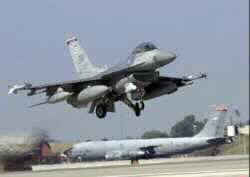The Turkish parliament decided to extend the mandate of a joint US-British force tasked with supervising a no-fly zone in northern Iraq, the Anatolia news agency reported.The decision came as NATO-member Turkey was debating whether to back its key ally the United States in possible military strikes against Iraq and the extent of its support.With Wednesday's parliamentary approval, the mandate of the force, called Operation Northern Watch (ONW), has been extended for six months, effective of December 31.
Northern Watch was put into operation in January 1997 and involves around 40 British and American aircraft which operate out of the Incirlik base in the south of Turkey.
Its mandate has since been renewed by parliament every six months.
The force is charged with enforcing a no-fly zone north of the 36th parallel in order to protect the Kurdish population in the region which has been outside Baghdad's control since the 1991 Gulf War.
Baghdad does not recognise the northern no-fly zone nor a twin zone in the south of Iraq aimed at protecting the Shiite Muslim population. Neither zone is authorised by any specific UN resolution.
Iraqi forces have regularly fired on aircraft patrolling the northern and southern regions since US-British air raids in December 1998.
The Turkish government is currently under heavy pressure to provide logistic and military support to the United States in the event of a war to topple the regime in Baghad.
Washington has reportedly asked Ankara for permission to use air bases, move troops into northern Iraq via Turkey and deploy soldiers on Turkish soil.
A cabinet meeting earlier Wednesday ended with no concrete decision.
"We have evaluated the latest developments in US-Iraq relations and discussed the various alternatives before us," Deputy Prime Minister and government spokesman Abdullatif Sener told reporters after the meeting.
He underlined the cabinet had not taken any decisions on the issue.
The Iraqi conflict is widely expected to dominate the agenda of the monthly meeting on Friday of the national security council, the country's top decision-making body which is dominated by the powerful army.
Any decision on military assistance would then require approval from the parliament.
Turkey is concerned that a war in Iraq could exacerbate its economic woes and spawn an independent Kurdish state in northern Iraq, an event which it fears could spark unrest among its own sizeable Kurdish community in the southeast.
PHOTO CAPTION
A missile loaded U.S. Air Force F-16C Falcon fighter takes off from Incirlik air base in southern Turkey in this Sept. 13, 2002 file photo for a daily mission over the No-Fly Zone in Northern Iraq to monitor Iraqi compliance with United Nations Security Council resolutions. Turkish base of Incirlik was a staging point for U.S. attacks during the Gulf War in 1991. Turkish parliament renewed Wednesday, Dec. 25, 2002 permission for U.S. and British plane to use Incirlik air base. A U.S Air Force tanker, KC-135 Stratotanker, is sitting on the tarmac. (AP Photo/Burhan Ozbilici/File)
- Dec 25 12:38 PM ET
- Author:
& News Agencies - Section:
WORLD HEADLINES


 Home
Home Discover Islam
Discover Islam Quran Recitations
Quran Recitations Lectures
Lectures
 Fatwa
Fatwa Articles
Articles Fiqh
Fiqh E-Books
E-Books Boys & Girls
Boys & Girls  Women
Women










